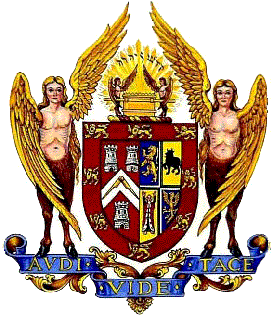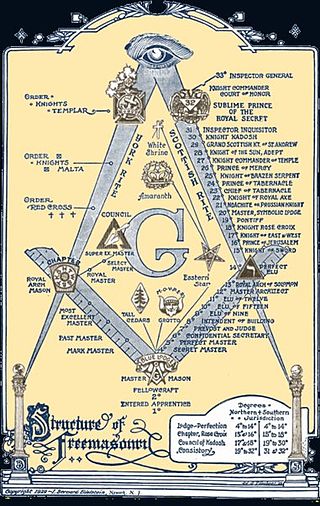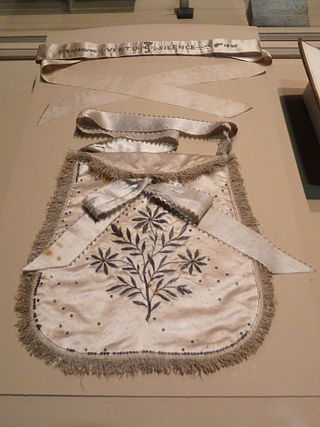
Freemasonry or simply Masonry includes various fraternal organisations that trace their origins to the local guilds of stonemasons that, from the end of the 14th century, regulated the qualifications of stonemasons and their interaction with authorities and clients. Freemasonry is the oldest fraternity in the world and among the oldest continued organizations in history.

A Masonic lodge, also called a private lodge or constituent lodge, is the basic organisational unit of Freemasonry.
The history of Freemasonry encompasses the origins, evolution and defining events of the fraternal organisation known as Freemasonry. It covers three phases. Firstly, the emergence of organised lodges of operative masons during the Middle Ages, then the admission of lay members as "accepted" or "speculative" masons, and finally the evolution of purely speculative lodges, and the emergence of Grand Lodges to govern them. The watershed in this process is generally taken to be the formation of the first Grand Lodge in London in 1717. The two difficulties facing historians are the paucity of written material, even down to the 19th century, and the misinformation generated by masons and non-masons alike from the earliest years.

Arthur Greenwood was a British politician. A prominent member of the Labour Party from the 1920s until the late 1940s, Greenwood rose to prominence within the party as secretary of its research department from 1920 and served as Parliamentary Secretary to the Ministry of Health in the short-lived Labour government of 1924. In 1940, he was instrumental in resolving that Britain would continue fighting Nazi Germany in World War II.

William Preston was a Scottish author, editor and lecturer, born in Edinburgh. After attending school and college he became secretary to the linguist Thomas Ruddiman, who became his guardian on the death of his father. On the death of Thomas, Preston became a printer for Walter Ruddiman, Thomas' brother. In 1760 he moved to London and started a distinguished career with the printer William Strahan. He became a Freemason, instituting a system of lectures of instruction, and publishing Illustrations of Masonry, which ran to several editions. It was under Preston that the Lodge of Antiquity seceded from the Moderns Grand Lodge to become "The Grand Lodge of All England South of the River Trent" for ten years. He died on 1 April 1818, after a long illness, and was buried in St Paul's Cathedral.

The United Grand Lodge of England (UGLE) is the governing Masonic lodge for the majority of freemasons in England, Wales, and the Commonwealth of Nations. Claiming descent from the Masonic Grand Lodge formed 24 June 1717 at the Goose & Gridiron Tavern in London, it is considered to be the oldest Masonic Grand Lodge in the world, together with the Grand Lodge of Scotland, and the Grand Lodge of Ireland.
Anti-Masonry is "avowed opposition to Freemasonry", which has led to multiple forms of religious discrimination, violent persecution, and suppression in some countries as well as in various organized religions. However, there is no homogeneous anti-Masonic movement. Anti-Masonry consists of radically differing criticisms from frequently incompatible political institutions and organized religions that oppose each other, and are hostile to Freemasonry in some form.
While many Christian denominations either allow or take no stance on their members joining Freemasonry, others discourage or prohibit their members from joining the fraternity.

There are many organisations and orders which form part of the widespread fraternity of Freemasonry, each having its own structure and terminology. Collectively these may be referred to as Masonic bodies, Masonic orders, Concordant bodies or appendant bodies of Freemasonry.
The 1935 Labour Party leadership election took place on 26 November 1935 when Herbert Morrison and Arthur Greenwood challenged Clement Attlee, the incumbent party leader of only one month and one day. Attlee, previously Deputy Leader, had been appointed as an interim leader the previous month when George Lansbury resigned and the general election was looming.

Freemasonry has had a complex relationship with women for centuries. A few women were involved in Freemasonry before the 18th century, despite de jure prohibitions in the Premier Grand Lodge of England.

The organisation now known as the Premier Grand Lodge of England was founded on 24 June 1717 as the Grand Lodge of London and Westminster. Originally concerned with the practice of Freemasonry in London and Westminster, it soon became known as the Grand Lodge of England. Because it was the first Masonic Grand Lodge to be created, modern convention now calls it the Premier Grand Lodge of England in order to distinguish it from the Most Ancient and Honourable Society of Free and Accepted Masons according to the Old Constitutions, usually referred to as the Ancient Grand Lodge of England, and the Grand Lodge of All England Meeting at York. It existed until 1813, when it united with the Ancient Grand Lodge of England to create the United Grand Lodge of England.
Reverend Sir Herbert Dunnico was a British Baptist minister, leading Freemason and Labour Party politician.

The Grand Lodge of Free & Accepted Masons of Indiana is one of two statewide organizations that oversee Masonic lodges in the state of Indiana. It was established on January 13, 1818. In 2016 the number of Freemasons in the Grand Lodge of Indiana was 55,553 amongst its 394 separate lodges, currently making it the sixth largest Masonic jurisdiction in the U.S. The Grand Lodge of Indiana's offices and archives are located in the Indianapolis Masonic Temple. The historically black Most Worshipful Prince Hall Grand Lodge of Indiana F&AM is the second regular Masonic grand lodge in the state, and it was originally established in 1856 as the Independent Union Grand Lodge of Free and Accepted Masons of the State of Indiana. The two grand lodges agreed to mutual recognition in May 1998, and they jointly share sovereignty over the Masonic fraternity in Indiana.

Herbert Stanley Morrison, Baron Morrison of Lambeth, was a British politician who held a variety of senior positions in the Cabinet as a member of the Labour Party. During the inter-war period, he was Minister of Transport during the Second MacDonald ministry, then after losing his parliamentary seat in the 1931 general election, he became Leader of the London County Council in the 1930s. After returning to the Commons, he was defeated by Clement Attlee in the 1935 Labour Party leadership election but later acted as Home Secretary in the wartime coalition.
The Gallery Lodge is one of two Masonic lodges within the UK Parliament. The core of its membership are journalists accredited to Parliament. It is the only lodge that is exclusively for journalists.
Freemasonry in Spain is first recorded in 1728, in an English lodge. As various papal bulls condemned Freemasonry the Spanish Inquisition did their best to close lodges and demonise Freemasons, therefore the success of Freemasonry from year to year depended on the sympathy or antipathy of the ruling regime. Nevertheless, lodges and even Grand Lodges were formed, and even thrived during more liberal periods. When Francisco Franco consolidated power in 1939, all Freemasonry was banned. In 1979, four years after Franco's death, bans on Freemasonry were declared unconstitutional, and several Grand Lodges and Orients now flourish in Spain.
Martin John Short was a British TV documentary producer and author. He is best known for his exposés on organized crime and on Freemasonry.
Freemasonry in Scotland in lodges chartered by the Grand Lodge of Scotland comprises the Scottish Masonic Constitution as regular Masonic jurisdiction for the majority of freemasons in Scotland. There are also lodges operating under the Scottish Masonic Constitution in countries outside of Scotland. Many of these are countries linked to Scotland and the United Kingdom through the Commonwealth of Nations and prior colonies and other settlements of the British Empire although there are several lodges in countries such as Lebanon, Belgium, Chile and Peru, which do not have such connections.










